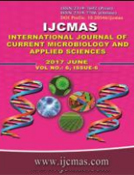


 National Academy of Agricultural Sciences (NAAS)
National Academy of Agricultural Sciences (NAAS)

|
PRINT ISSN : 2319-7692
Online ISSN : 2319-7706 Issues : 12 per year Publisher : Excellent Publishers Email : editorijcmas@gmail.com / submit@ijcmas.com Editor-in-chief: Dr.M.Prakash Index Copernicus ICV 2018: 95.39 NAAS RATING 2020: 5.38 |
The present article has been reviewed to know the importance of different plant products (botanicals) against storage insect pests of seeds and grains. Storage of grains is very important in agriculture for next generation and for food security. Among various biotic and abiotic factors which determine fate of grains during storage, insect pests are of economic importance as they cause significant loss. By reducing or eliminating the insect pest population while storage the rising demands of the increasing population of the world can be fulfilled. Among various storage insect pests Sitotroga cerealella, Sitophilus sp., Rhyzopertha Dominica, Trogoderma granarium, Tribolium sp., Callosobruchus sp. etc. are most detrimental. Insect damages include consumption of seed, debris of exuviae, webbing, and cadavers thereby makes the grain unfit for human consumption and also reduce quality as well as quantity. They manipulates storage environment resulted in development of hotspots which are congenial for the proliferation of storage fungi and other harmful micro flora. Conventionally we are exploiting synthetic pesticides to manage different insect pests which are hazardous to environment and ecosystem in various ways such as elimination of natural enemies; insect resistance and resurgence problem; making soil, water and air sick; have residual effects thereby cause different disorders or diseases to animals and humans. Biodegradable, non-residual, equally effective and easily available botanicals such as neem (Azadirachta indica), bach (Acorus calamus), phoolakri (Lantana camara), draik (Melia azadarach), kali mirch (Piper nigrum), Basuti (Adhatoda zeylanica) etc. may prove to be a better option to control insect pests including storage pests without affecting the quality of grains or seeds and without harming our ecosystem or environment. Thus botanicals may be recommended alone or as a part of IPM to control insect pests.
 |
 |
 |
 |
 |